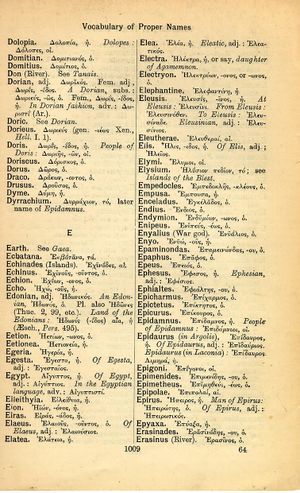Elis
ἴσον ἔχουσαν πατρὶ μένος καὶ ἐπίφρονα βουλήν (Hesiod, Theogony 896) → equal to her father in strength and in wise understanding (on Athena necklace)
English > Greek (Woodhouse)
Ἦλις, -ιδος, ἡ.
Of Elis, adj.: Ἠλεῖος.
Latin > English (Lewis & Short)
Ēlis: ĭdis (acc. Elin, Ov. M. 2, 679; 5, 608; 12, 550; Stat. S. 2, 6, 47; Plin. 2, 71, 73, § 181; 7, 20, 20, § 84:
I Elidem, Nep. Alcib. 4, 4; abl. usually Elide; but Eli, Cic. N. D. 3, 23, 59; id. Fam. 13, 26, 2), f., = Ηλις; also Ālis, Alidis = Dor. Ἀλις (Plaut. Capt. prol. 9, 26, 31; cf. Aleus, id. ib. 27), the most westerly district of the Peloponnesus, with a capital of the same name, in the vicinity of which Olympia was situated, Mel. 2, 3, 4; Plin. 4, 6, 10, § 22; Cic. Div. 1, 41; Verg. A. 3, 694; 6, 588; Ov. M. 9, 187; Val. Fl. 1, 389 et saep.—Of the capital, Nep. Alcib. 4, 4; Ov. M. 12, 550.—
II Derivv.
A Ēlēus, a, um, adj., Elean; and in the poets also for Olympian: flumen, i. e. the Alphēus, Ov. M. 5, 576; called also Eleus amnis, Poëta ap. Sen. Q. N. 3, 1: campus, i. e. Olympia, Verg. G. 3, 202; cf.: carcer, Tib. 1, 4, 33; Ov. H. 18, 166: quadriga, Prop. 3, 9, 17 (4, 8, 17 M.): palma, Hor. C. 4, 2, 17: Juppiter, Prop. 3, 2, 20 (4, 1, 60 M.); called also Eleus parens, Val. Fl. 4, 227: lustra, Stat. S. 2, 6, 72.—In plur. subst.: Ēlēi, ōrum, m., the inhabitants of Elis, Plin. 10, 28, 40, § 175.—
B Ēlĭi, ōrum, m., the inhabitants of Elis, the Eleans, Cic. Div. 2, 12, 28; Plin. 4, 5, 6, § 14.—
C * Ēlēis, ĭdis, f., adj., Elean: humus, Verg. Cat. 11, 32 Heyne.—
D * Ēlĭas, ădis, f., adj., Elean, poet. for Olympian: equae, Verg. G. 1, 59.—
E * Ēlĭdensis, e, adj., of Elis: Phaedo, Gell. 2, 18, 1.

